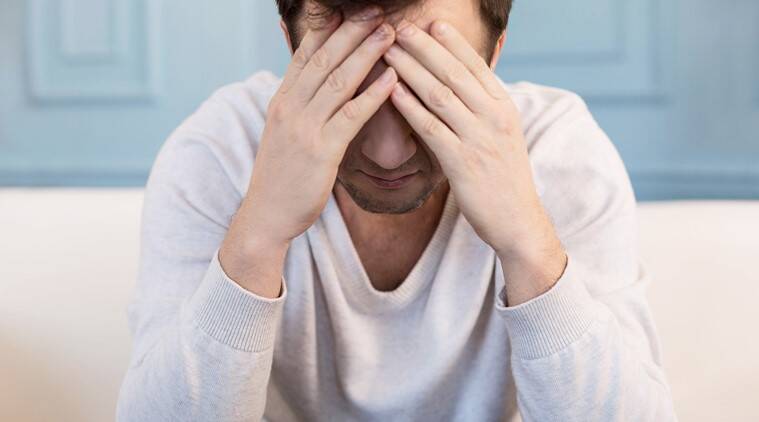While postpartum depression is widely recognized in mothers, its presence in fathers is often overlooked, casting a shadow on many new families. Male postpartum depression (PPD) affects a significant number of new dads, who may struggle with intense feelings of sadness, anxiety, and fatigue following the birth of their child. This blog delves into the silent plight of these fathers, shedding light on the available male postpartum depression treatment options that can guide them back to well-being.
Contents
What Are The Challenges Of Male Postpartum Depression?
 Male postpartum depression (PPD) presents several unique challenges that can affect men’s mental health and the overall dynamics within a family. Here are some of the key challenges associated with male PPD:
Male postpartum depression (PPD) presents several unique challenges that can affect men’s mental health and the overall dynamics within a family. Here are some of the key challenges associated with male PPD:
- Lack of Awareness
There is generally less awareness about male PPD compared to maternal postpartum depression. Men, their families, and even some healthcare providers may not recognize the signs, leading to underdiagnosis.
- Misinterpretation of Symptoms
Symptoms of depression in men can sometimes manifest differently, such as increased irritability, aggression, or risky behavior. This might not be readily identified as a sign of depression.
- Stigma Around Male Mental Health
Cultural norms about masculinity and mental health can discourage men from acknowledging feelings of sadness or vulnerability. Ultimately, leading to reluctance to seek help.
- Perceived Roles
Men might feel an overwhelming pressure to be the strong, supportive partner and may ignore their own emotional needs.
- Inadequate Screening Practices
Routine postpartum screenings often focus more on mothers. So fathers may not be screened for PPD during pediatric visits or in other settings.
- Strain on Relationships
Male PPD can put a significant strain on relationships with partners. This may already be under stress from new responsibilities and changes in the family.
- Neglect of Physical Health
Men dealing with depression might neglect their physical health. Hence, leading to a cycle of poor lifestyle choices and worsening mental health.
Addressing these challenges requires a concerted effort to increase awareness, improve healthcare screening and support for men, and challenge the stigmas associated with male mental health, particularly in the context of fatherhood.
What Are The Male Postpartum Depression Treatment?
 Treating male postpartum depression (PPD) involves a combination of strategies tailored to address the unique emotional and mental health needs of new fathers. Here are some effective treatment options:
Treating male postpartum depression (PPD) involves a combination of strategies tailored to address the unique emotional and mental health needs of new fathers. Here are some effective treatment options:
Psychotherapy
- Cognitive Behavioral Therapy (CBT): This therapy helps individuals recognize and change negative thought patterns and behaviors. It’s effective in treating depression by teaching coping skills and resilience.
- Couples Therapy: Since male PPD can strain relationships, couples therapy can be beneficial in improving communication and understanding between partners.
- Group Therapy: Participating in therapy sessions with other fathers can provide support and validation. This is crucial for those feeling isolated in their experiences.
Medication
- Antidepressants: SSRIs (Selective Serotonin Reuptake Inhibitors) are commonly prescribed for depression and can be effective in managing the symptoms of PPD in men. Medication may be used alone or in combination with psychotherapy.
- Consultation with a Psychiatrist: A psychiatrist can provide a comprehensive assessment and prescribe medication if needed, monitoring for any side effects and adjusting the treatment as necessary.
Education and Awareness
- Parenting Classes: These can provide fathers with skills and confidence in their parenting. And, reducing stress and enhancing their relationship with their child.
- Mental Health Education: Learning about depression, including its symptoms and effects, can empower men to seek help and understand their experiences.
Support Networks
- Peer Support Groups: Connecting with other fathers who have experienced similar issues can reduce feelings of isolation and provide practical advice and emotional support.
- Online Communities: Online platforms can offer resources and connections with others at any time. This is particularly beneficial for those who may have mobility or time constraints.
Professional Help
- Seeking Regular Check-Ups: Regular check-ups with a healthcare provider can help monitor the progress of the father’s mental health and adjust treatments as needed.
- Therapeutic Interventions: In some cases, more intensive therapeutic interventions might be required, such as inpatient care or specialized programs focusing on paternal mental health.
By integrating these treatment options, men suffering from PPD can find significant relief and improve their ability to enjoy fatherhood and family life. Healthcare providers and families must recognize the signs of male PPD early and encourage treatment-seeking behavior.
What Is The Natural Male Postpartum Depression Treatment?
Natural treatment options for male postpartum depression (PPD) focus on holistic approaches that can help manage and alleviate symptoms without the use of medication.
Practical tips
Here are several effective natural treatments:
Exercise and Physical Activity
Regular exercise is highly effective in reducing symptoms of depression. Activities like running, walking, cycling, or even team sports can boost endorphins and improve overall mood and mental health.
Diet and Nutrition
A well-balanced diet rich in omega-3 fatty acids, whole grains, lean proteins, and plenty of fruits and vegetables can impact brain health and mood. Reducing the intake of processed foods and sugars is also beneficial.
Adequate Sleep
Sleep is crucial for mental health. Establishing a good sleep routine and creating a restful environment can help manage stress and reduce depressive symptoms.
Mindfulness and Meditation
Practices like meditation, yoga, and tai chi can reduce stress, increase feelings of well-being, and improve mental clarity. Mindfulness helps in managing emotions and reducing anxiety.
Sunlight and Fresh Air
Exposure to natural sunlight can increase serotonin levels, which improves mood. Spending time outdoors, especially in green spaces, can have a calming and rejuvenating effect.
Herbal Remedies and Supplements
Certain herbs and supplements are thought to help with depression. St. John’s Wort, omega-3 fatty acids, magnesium, and vitamin D have been studied for their potential to improve mood. However, it’s important to consult with a healthcare provider before starting any supplements, especially if other medications are being taken.
Acupuncture
Acupuncture can help in managing depression by targeting specific points in the body to balance energy flow and stimulate the nervous system.
Breathing Exercises
Controlled breathing techniques can help in managing anxiety and stress. These are often associated with depression.
Structured Routine
Establishing a daily routine can provide a sense of structure and normalcy. It can be very helpful in managing depression.
Natural treatments can be very effective, especially in mild to moderate cases of male PPD. However, individuals must consult with healthcare professionals. They will help to ensure a comprehensive approach to treatment, particularly if symptoms are severe or persistent.
How To Get Started With The Male PPD Treatment?
 To get started with treatment for male postpartum depression (PPD), it’s important to take a structured approach to ensure that the treatment is effective and addresses the individual’s specific needs. Here are the steps to begin:
To get started with treatment for male postpartum depression (PPD), it’s important to take a structured approach to ensure that the treatment is effective and addresses the individual’s specific needs. Here are the steps to begin:
- Acknowledge the Issue
The first step in seeking treatment is acknowledging the presence of symptoms and understanding that postpartum depression can affect fathers as well. Recognizing that these feelings are valid and require attention is crucial.
- Discuss Treatment Options
During the consultation, discuss all possible treatment options that align with personal preferences and medical advice. This includes discussing any hesitations about certain types of treatments and the possibility of integrating natural and medical treatments.
- Set Realistic Goals
Work with the healthcare provider to set realistic goals for recovery. This might include short-term goals like improving sleep patterns or long-term goals like enhancing emotional connectivity with the family.
- Engage in Educative Opportunities
Educate yourself about male PPD through books, reputable online resources, or workshops. So, understanding the condition can demystify many aspects of it and reduce any associated stigma.
- Plan for Regular Follow-ups
Regular follow-ups with the healthcare provider are important to monitor progress, make adjustments to the treatment plan, and address any emerging issues. This also helps in maintaining motivation and accountability.
- Involve Your Support System
Inform close family members or friends about the situation and how they can support you. This could be through practical support like helping with household duties or emotional support by just being there to listen.
- Document Your Journey
Keep a journal of your emotions, symptoms, and any triggers. This can help in recognizing patterns, understanding what exacerbates or alleviates your symptoms, and discussing these insights during therapy sessions.
By following these steps, individuals can begin their journey toward recovery in a structured and supportive manner. Hence, it’s essential to remember that seeking help is a sign of strength, not weakness, and it’s the first step toward reclaiming well-being.
Conclusion
In conclusion, male postpartum depression is a significant but often overlooked condition that can deeply affect new fathers. Recognizing the symptoms and seeking help are the first crucial steps toward healing. Treatment options vary from professional therapy and medication to natural methods and lifestyle changes. All of which aim to support the mental health of new dads.
For more information, please contact MantraCare. Depression is a mental illness characterized by persistent feelings of sadness, hopelessness, & loss of interest in daily activities. If you have any queries regarding Online Depression Counseling experienced therapists at MantraCare can help: Book a trial Depression Therapy session now.


